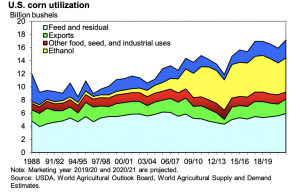Reuters reported Tuesday that "the top U.S. oil and corn industry lobby groups said on Tuesday they were suing the administration of President Joe Biden over its plans to slash…
Administration Could Grant Last-Minute Biofuel Waivers
Earlier this week, Reuters writers Stephanie Kelly and Jarrett Renshaw reported that, “The Trump administration is expected to grant waivers to some oil refiners that would exempt them from requirements to blend biofuels into their fuel mix for the 2019 compliance year, according to two sources familiar with the matter.
“The move would be one of the last actions by President Donald Trump’s Environmental Protection Agency to seek to balance the competing desires of the biofuel and oil industries over biofuel blending laws. The decision, however, would be a blow to the biofuel industry and corn producers that say the exemptions hurt demand for their products, though the oil industry rejects that claim.”
Secretary @EPAAWheeler – I hope this isn’t true. It would be shameful in the final hours of your administration to take an action that would be so costly to rural America. There is little evidence that says these waivers are legal. https://t.co/EKrWVqyztP
— Rep. Dusty Johnson (@RepDustyJohnson) January 12, 2021
The Reuters article indicated that, “The announcement could come as early as this week, one of the sources said, and would apply to some exemptions for the 2019 compliance year. There are currently 32 pending petitions for the 2019 compliance year, according to EPA’s website.”
Reports that the Trump Administration is considering an eleventh hour approval of another round of illegal small refinery waivers is UNACCEPTABLE.
— Rep. Cindy Axne (@RepCindyAxne) January 13, 2021
For the sake of our farmers and biofuels producers, the House Biofuels Caucus is urging them to reverse course.
Read our letter ⬇️ pic.twitter.com/yMjH59tFlf
“Under the U.S. Renewable Fuel Standard, refiners must blend billions of gallons of biofuels like corn-based ethanol into their fuel mix, or buy credits from those that do. Refiners can apply for exemptions if they can prove the obligations would cause them financial harm.”
And Bloomberg writers Jennifer A Dlouhy, Jennifer Jacobs, and Kim Chipman reported this week that,
The Trump administration is expected to exempt some oil refineries from 2019 mandates to use renewable fuel as it readies possible last-minute moves on U.S. biofuel policy.
“Environmental Protection Agency officials also are considering formally extending deadlines for oil refineries to prove they have complied with renewable fuel quotas for 2019 and 2020, as legal uncertainty surrounds the biofuel program. The policy announcements being contemplated by the administration were described by multiple people familiar with the matter who asked not to be named before a formal announcement.
I co-led a Biofuels Caucus letter to the President opposing reports that @EPA plans to approve remaining "small" refinery exemptions, reversing previous policy. These SREs are against the law, hurt rural economies, and should be rejected outright. pic.twitter.com/9TSZa7JTVk
— Rep. Adrian Smith (@RepAdrianSmith) January 13, 2021
The Bloomberg article noted that, “The flurry of activity during President Donald Trump’s final days in office comes after the Supreme Court agreed to hear a case testing the ability of refineries to win exemptions from annual biofuel-blending quotas. Confusion has surrounded the matter since the 10th Circuit Court of Appeals ruled in January 2020 that the EPA wrongly granted some of those exemptions and that refineries are only eligible for waivers if they have continually received them.”

Meanwhile, DTN writer Todd Neeley reported this week that, “The Renewable Fuels Association will file a legal challenge to any new small-refinery exemptions the EPA issues going forward, the group announced in a letter to EPA Administrator Andrew Wheeler on Tuesday.
Trump undermined the Renewable Fuel Standard and chose big oil and greenhouse gas emissions over hardworking US farmers.
— Sen. Tammy Baldwin (@SenatorBaldwin) January 12, 2021
I’m calling on the Biden admin to take bold action to support farmers and rural communities by restoring strong biofuels policy as we combat climate change. pic.twitter.com/bYBWceWDp1
“Earlier this week a news report indicated the Trump administration may grant at least some exemptions in response to 32 pending requests for 2019.
“RFA President and Chief Executive Officer Geoff Cooper said in a letter to Wheeler the group is ready to act.”
Also, on Thursday, Reuters writer Stephanie Kelly reported that, “The U.S. Environmental Protection Agency has proposed further extending the deadlines for oil refiners to prove they have complied with the nation’s biofuel blending laws, after the agency first delayed enforcement because of the effects of the coronavirus pandemic.
“Refiners must hand in credits to the EPA each year to prove they complied with their annual blending obligations for the previous year. The extension, which will help oil refiners but could anger the biofuel industry, is one of the last actions from President Donald Trump’s EPA before he leaves office.”
Ms. Kelly indicated that, “The agency said it is proposing to extend the compliance deadline for 2019 to Nov. 30, 2021, and an associated deadline for submission of attest engagement reports to June 1, 2022. The EPA is also proposing to extend the 2020 deadlines to Jan. 31, 2022, and June 1, 2022.
“The proposal was outlined in a document seen by Reuters that is scheduled to be posted on the Federal Register on Friday.”







